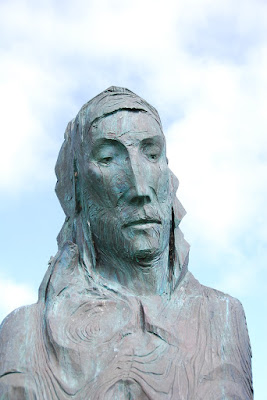Cuthbert and self isolation
On this day 20 March in 687 AD St Cuthbert died in his hermit cell on Inner Farne Island. So today is St Cuthbert's Day in honour of one of the most popular saints of Britain. I think he might have had much to teach us about making the best use of physical isolation from others.
In his youth Cuthbert cared for sheep, either as a shepherd boy, or as a guard for the flock. That surely must have involved a lot of solitary time. Later, having had a vision as a child that made him decide to dedicate his life to God, he became a monk. Eventually he became Abbott of Lindisfarne and then a Bishop. As a bishop he travelled and preached as he walked over the rough hills of his diocese. In between those journeys he spent time as a hermit on Farne Island - chosen self-isolation in order to deepen his relationship with God and so be more useful to those who needed his spiritual guidance.
For Cuthbert, to be human was to live in dependence on God, aware of his constant presence. You could call this simplicity, being pure in heart and poor in spirit.
His mortal remains now lie in Durham Cathedral, under a simple stone that just says "Cuthbertus". On the one occasion I visited there, I experienced a profound sense of peace and the presence of God. You don't need to go to Durham to experience that. You might find it just by sitting at home, being still, or taking a walk round your garden if you have one. At this time when the people of the world are struggling to cope with Covid 19 and we are observing strict spatial distancing from one another, we all need to find peace in solitude. Your local church has probably suspended meetings for public worship, but many church buildings are open at least part of the day for anyone to enter to pray or just take a moment to find peace in a place where prayer has been regularly made for sometimes hundreds of years. You don't have to be a Christian to go and sit alone in a church. Try it.
In his youth Cuthbert cared for sheep, either as a shepherd boy, or as a guard for the flock. That surely must have involved a lot of solitary time. Later, having had a vision as a child that made him decide to dedicate his life to God, he became a monk. Eventually he became Abbott of Lindisfarne and then a Bishop. As a bishop he travelled and preached as he walked over the rough hills of his diocese. In between those journeys he spent time as a hermit on Farne Island - chosen self-isolation in order to deepen his relationship with God and so be more useful to those who needed his spiritual guidance.
For Cuthbert, to be human was to live in dependence on God, aware of his constant presence. You could call this simplicity, being pure in heart and poor in spirit.
His mortal remains now lie in Durham Cathedral, under a simple stone that just says "Cuthbertus". On the one occasion I visited there, I experienced a profound sense of peace and the presence of God. You don't need to go to Durham to experience that. You might find it just by sitting at home, being still, or taking a walk round your garden if you have one. At this time when the people of the world are struggling to cope with Covid 19 and we are observing strict spatial distancing from one another, we all need to find peace in solitude. Your local church has probably suspended meetings for public worship, but many church buildings are open at least part of the day for anyone to enter to pray or just take a moment to find peace in a place where prayer has been regularly made for sometimes hundreds of years. You don't have to be a Christian to go and sit alone in a church. Try it.

Comments
Post a Comment